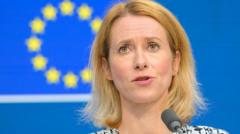The Geopolitical Chessboard: Ukraine, Russia, and the Dilemma of Land Concessions
 The Tech Times
The Tech Times
In the complex world of international diplomacy, the balance between peace and sovereignty often rests on a knife's edge. Recent statements by Kaja Kallas, the European Union's top diplomat, have cast a spotlight on the precarious situation in Ukraine, warning that proposed land concessions to Russia may be a strategic trap laid by President Vladimir Putin. This analysis emerges as former U.S. President Donald Trump sets a narrow window for assessing peace talks between Moscow and Kyiv, further complicating the geopolitical landscape.
Historical Context: A Long-standing Struggle
The conflict between Russia and Ukraine is steeped in history, stretching back to the dissolution of the Soviet Union in 1991. Ukraine's independence marked the beginning of a complex relationship with Russia, characterized by political, cultural, and territorial disputes. The annexation of Crimea by Russia in 2014 and the subsequent war in Eastern Ukraine have further strained this relationship, leading to ongoing violence and instability.
The Minsk agreements, meant to establish a ceasefire and provide a political solution, have largely failed to bring about lasting peace. The situation remains volatile, with periodic escalations and a persistent humanitarian crisis affecting millions of people.
The Current Scenario: A Trap or a Path to Peace?
Kaja Kallas' assertion that land concessions could be a strategic trap by Putin is not without merit. From a geopolitical perspective, any territorial compromise could be perceived as a sign of weakness, emboldening Russian expansionist ambitions. This concern resonates with historical precedents, where territorial concessions have sometimes led to further aggression rather than peace.
From Russia's standpoint, securing territorial gains through diplomacy, rather than continued military engagement, could be seen as a victory. This strategy aligns with the broader Russian objective of maintaining influence over Ukraine and countering Western alliances.
The Role of International Actors
The involvement of international actors, such as the United States and the European Union, adds layers of complexity to the situation. Trump's focus on a two-week period to evaluate the progress of peace talks suggests a desire for rapid resolution, yet the reality on the ground is far more intricate.
The EU's position, as articulated by Kallas, reflects a cautious approach, wary of the long-term implications of any agreement that might undermine Ukraine's territorial integrity. The diplomatic tightrope walk involves balancing the urgency for peace with the principles of sovereignty and self-determination.
Conclusion: Navigating the Path Forward
As the world watches the developments in Ukraine, the stakes could not be higher. The potential for land concessions to serve as a geopolitical trap underscores the need for a nuanced approach to diplomacy. Historical lessons remind us that peace agreements built on compromise without addressing underlying issues often fail to bring lasting stability.
For Ukraine, the path forward must prioritize sovereignty and the protection of its territorial integrity. For the international community, the challenge lies in supporting Ukraine's aspirations while engaging Russia constructively to prevent further escalation.
In the end, the resolution of this conflict will require more than just political maneuvering—it will necessitate genuine commitment to peace, reconciliation, and respect for international law. The coming weeks will test the resolve of all parties involved and could reshape the geopolitical landscape for years to come.
Source: Proposed Ukraine land concessions are Putin's trap, EU's top diplomat tells BBC
Subscribe to my newsletter
Read articles from The Tech Times directly inside your inbox. Subscribe to the newsletter, and don't miss out.
Written by
